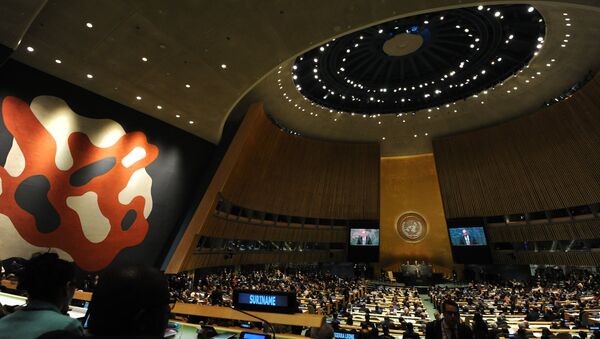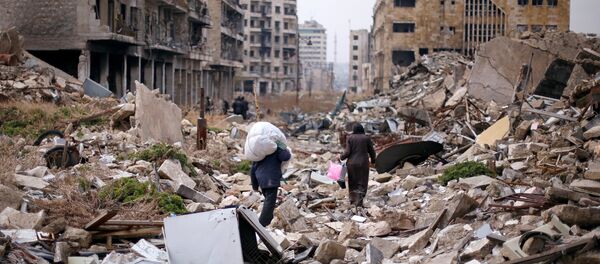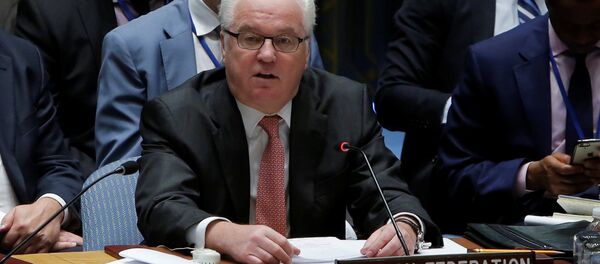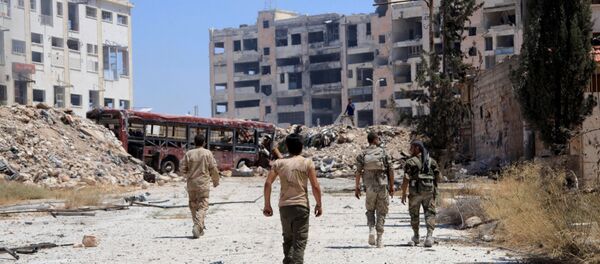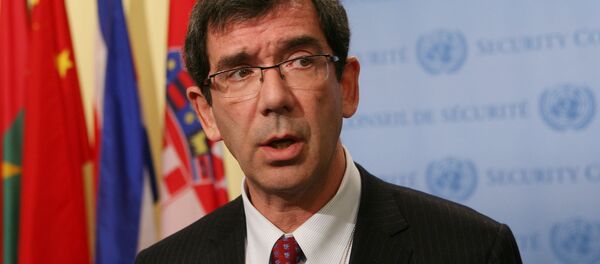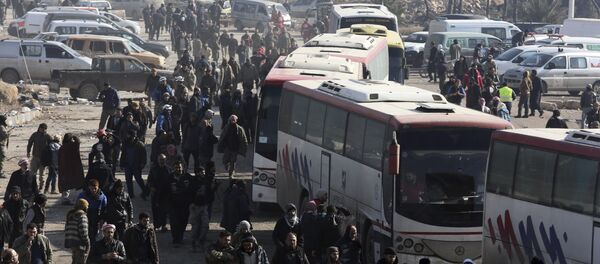The Liechtenstein-proposed resolution was adopted on Wednesday by 105 votes in favor, with 52 abstentions, while 15 countries including China, Russia and Syria voted against.
"It goes without saying that this resolution is merely a continuation of the war against Syria in different means. The Western powers along with the oil rich Gulf states are rabidly looking for every possible tactic and venue to, intensify the smearing and demonizing campaign [against the Syrian government], divert the attention from the series of successes attained by the Syrian Arab Army and its allies, and, most important of all, pump more blood and vigor into the veins of the armed terrorist groups," Moustapha said.
Following the Wednesday vote, Syria's Ambassador to the UN Bashar Jaafari slammed the measure, saying it was contrary to the UN Charter and a "flagrant interference in the internal affairs of a UN member state," as well as "a direct threat to a solution" of the Syrian conflict.
Imad Moustapha also said that the UN Board of Inquiry’s investigation into the September attack on the UN-Syrian Arab Red Crescent aid convoy in Aleppo failed to name the perpetrator after it found no evidence proving Moscow or Damascus’ responsibility, contrary to the version pushed forward by the West.
"Had the investigation found the slightest shred of clues that would point to Russia and Syria, the investigation would have continued, given ample resources, and enjoyed great media and propaganda support. However, since it was mostly pointing to a different version of what the Western powers desired, it was brought to an inconclusive ending," Moustapha said.
"Now, it will be used and reused incessantly to create a cloud of allegations and insinuations without actually offering any substantiated evidence. The Western media are masterful in playing this game. And the Western leaders will mechanically repeat the allegations without caring for the burden of proof," the ambassador added.
At least 20 people were killed and 18 of the convoy’s 31 trucks were destroyed in the shelling in Syria's Aleppo province on September 19.
A number of US military officials have claimed Russia was responsible for the attack. White House Deputy National Security Adviser Ben Rhodes said the Syrian and Russian governments were the only entities that could have been responsible for it, while Chairman of the US Joint Chiefs of Staff Gen. Joe Dunford pinned the blame on Russia despite having admitted he was not sure who dropped the bombs.
Syrian diplomat noted that Russia played a decisive and politically necessary role in the operation to liberate the Syrian city of Aleppo, which proved it was truly interested in putting an end to terrorism and the suffering of civilians in the country.
"The participation of Russia in liberating Aleppo was both decisive and a political necessity… Russia’s large scale humanitarian aid and medical assistance, as well as the pivotal role played in the evacuation process were of paramount importance for discrediting the massive campaign of disinformation conducted by the Western media, and the hysteric reactions of the Western governments to the liberation of Aleppo," Moustapha said.
The Syrian ambassador added that Russia was not only interested in tackling terrorism in the city at all costs, but also cared for civilians in the war-torn country.
"Russia simply proved that it was not merely interested in combating terrorism, but equally interested in the welfare and safety of the civilians in Aleppo and elsewhere in Syria," Moustapha added.
"While the victory in Aleppo does not mean the end of the war against the terrorist groups, it has been such a dramatic and humiliating defeat to these groups that it will mark a watershed point after which the liberation process will gain more momentum and a vigorous thrust," Moustapha said.
On Thursday, the Syrian army said in a statement it had assumed full control over Aleppo, bringing back peace and security to the embattled city. In accordance with the agreement on local ceasefire, the remaining militants were allowed to leave the part of Aleppo they held control of.
Russia was engaged in both humanitarian and evacuation operations in the region.

